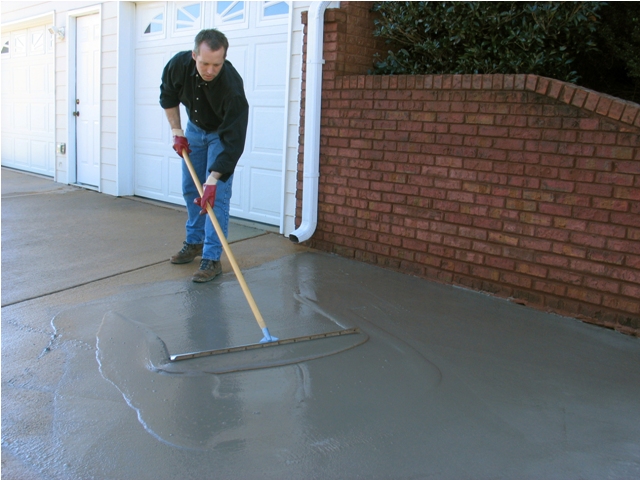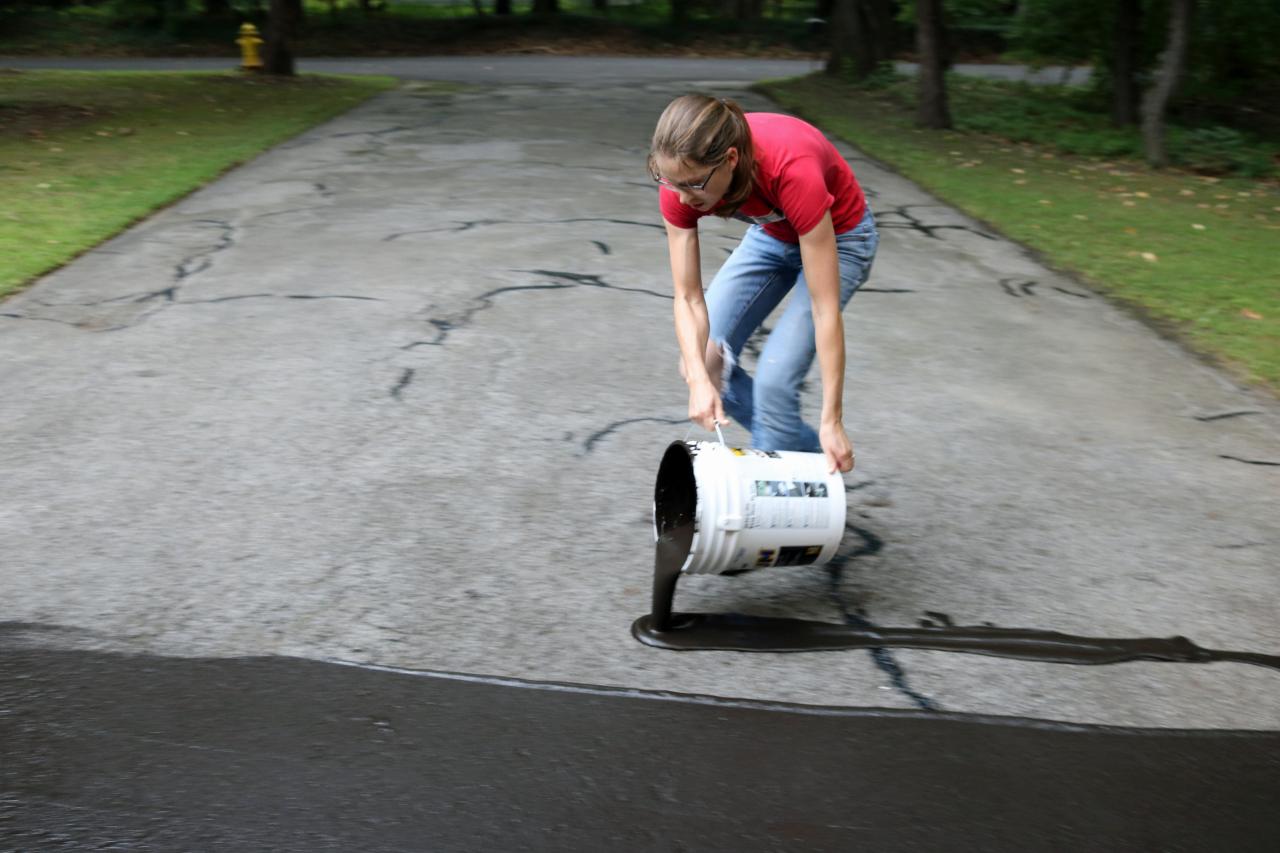
How do you keep a concrete driveway from cracking?
- Use kneepads to cushion your knees if you have to kneel to make a lot of repairs.
- To use the driveway as soon as possible, choose a rapid or fast-set crack filler.
- Some concrete patching compounds will harden in a few hours, but it make take days or a week for other kinds to cure and dry. ...
What are the steps to repaving a driveway?
- The best kind asphalt to use for a residential driveway is HL3.
- Order enough asphalt for 2.5 inches of thickness. ...
- Ensure you hire an experienced paver to apply the asphalt for this part (the asphalt must be applied when hot, you must pave it quickly!). ...
- Apply the asphalt in vertical paths, from the top-down.
How do you fill a crack in concrete?
- Prepare the sealant bottle as per manufacturer’s instructions (usually, shake well then snip off the nozzle
- With a steady hand, follow the line of the crack with the nozzle, gently squeezing out the sealant
- Go over the line with a putty knife, smoothing the ribbon of sealant into the surrounding concrete
When to repair or replace your driveway?
Your concrete driveway may be damaged if:
- There are cracks, splits, or breaks
- Your driveway isn’t clearing water or draining properly
- The seal or finish is corroded or worn away
- The base/foundation is unstable
- It is “too old” or beyond its lifespan

What is the best way to repair cracks in concrete driveway?
0:002:59Concrete Driveway Crack Repair - YouTubeYouTubeStart of suggested clipEnd of suggested clipIf your crack is more than a half an inch deep you want to use a filler rope in this and this isMoreIf your crack is more than a half an inch deep you want to use a filler rope in this and this is just a foam caulking.
Should I seal cracks in my concrete driveway?
Cracks up to ¼ inch in width can be filled with sealant. Cracks of this nature may never get any larger, but water can seep into them, freeze, and expand, causing the cracks to widen, so it's a good idea to seal them with the flexible Advanced Polymer Concrete Crack Sealant from Quikrete.
Can you repair a badly cracked concrete driveway?
A Driveway with cracked concrete should be replaced if due to widespread, deep cracks, settlement or sunken concrete. If concrete has cosmetic cracks, frost heaves, scaling or even potholes, it can be successfully repaired with FlexSet, PolyFlexDS or Concrete Welder in cartridges.
How do you permanently fix cracks in concrete?
0:142:21How to Repair, Seal and Waterproof Concrete Cracks - YouTubeYouTubeStart of suggested clipEnd of suggested clipUsing a chisel and hammer wind the crack to a minimum of one quarter inch. And break away anyMoreUsing a chisel and hammer wind the crack to a minimum of one quarter inch. And break away any deteriorating concrete the edges of the crack should be vertical or beveled in an inverted V.
How do you repair cracks in a driveway yourself?
1:194:48How to Fill Driveway Cracks - Driveway Crack Filler - YouTubeYouTubeStart of suggested clipEnd of suggested clipNow if you have a crack that's deeper than the inch you can put a little sand in this and bring itMoreNow if you have a crack that's deeper than the inch you can put a little sand in this and bring it up to within an inch or a half an inch of the surface.
How do I fill a large crack in my driveway?
1:162:22How To Fill Asphalt Gaps and Cracks - Ace Hardware - YouTubeYouTubeStart of suggested clipEnd of suggested clipUsing a caulk tube of crack filler. This is a good idea if you just have maybe one or two cracksMoreUsing a caulk tube of crack filler. This is a good idea if you just have maybe one or two cracks that are probably less than an eighth of an inch wide. And an eighth of an inch deep.
How much does it cost to repair cracks in concrete driveway?
Concrete driveway repairs cost $300 to $3,000 for fixing cracks, resurfacing, replacing sections, or leveling. Concrete resurfacing costs $3 to $7 per square foot. The cost to repair cracks in a concrete driveway is $5 to $10 for sealant and $8 to $12 for pre-mixed patching compound to cover 3 SF.
How do you repair an old concrete driveway?
0:394:28How to Resurface Concrete - YouTubeYouTubeStart of suggested clipEnd of suggested clipBefore resurfacing your slab deeply spalled areas and large cracks should be repaired using concreteMoreBefore resurfacing your slab deeply spalled areas and large cracks should be repaired using concrete resurfacer that has been mixed to a triable consistency.
Does Flex Seal work on concrete cracks?
Flex Seal can be used on almost every surface: wood, metal, tile, concrete, masonry, fabric, glass, plastic, aluminum, porcelain, drywall, rubber, cement, and vinyl. Plus, it won't sag or drip in the summer heat, and it won't crack or peel in the winter cold. It even prevents corrosion.
What is the best sealant for concrete cracks?
That means Loctite PL Concrete Non-Sag Polyurethane Sealant is the right choice: it's a concrete caulk that is suitable for repairing cracks in vertical and horizontal surfaces and bonds to concrete, brick, stucco, metal, wood, vinyl, fiberglass, and other substrates.
How do you seal large cracks in concrete?
0:382:01Repairing Large Cracks In Cement With Fast Setting Cement PatcherYouTubeStart of suggested clipEnd of suggested clipOn thin sections of the crack it may be necessary to turn the trowel sideways to ensure the void isMoreOn thin sections of the crack it may be necessary to turn the trowel sideways to ensure the void is filled. Using the trial continue to fill the cracks applying pressure to completely fill the void.
Does sealing a driveway stop it from cracking?
The truth is that sealing your concrete driveway won't actually get rid of the cracks that are already there. If your driveway has been pounded over the years by vehicles and the environment, the cracks that are already there won't be eliminated just because we put a layer of our tough and durable sealant over the top.
Does sealing driveway prevent cracks?
Driveway Sealers Using a sealant on your driveway can protect the pavement from cracks, extend the life of your driveway, and boost its overall appearance.
Why you should not seal concrete?
While sealing a concrete driveway can extend the life of the concrete by preventing cracks and fading, it also can be a pain to install. Sealer wears away and needs to be applied every few years. Once the sealer begins to wear, it can crack and peel, making your driveway unsightly.
Should you fix hairline cracks in concrete?
A well-made concrete structure should not develop structural cracks quickly. Nevertheless, hairline cracks can be expected. Don't stress; these cracks are not a sign of bad quality and can be fixed without much effort.
Why does my concrete crack?
These can be caused by everything from tree roots and movement of the soil to freezing and thawing cycles in the winter. Rather than breaking up the slab and pouring a new one, you might want to consider repairing it using Quikrete Concrete Resurfacer.
Can you fill holes in concrete?
I’d fill larger holes with a standard concrete mix, troweling it level with the surface. Once it’s set, you could go over the entire area with resurfacer if you wanted it to all have the same texture and color.
Can you mix resurfacer before applying concrete?
After allowing the material to dry overnight, a much thinner batch of resurfacer is mixed up. Before applying it, wet the concrete down to prevent it from drying out too quickly.
What to use to repair cracks in concrete driveway?
This type of crack is typically caused by a heavy vehicle driving along the edge of the driveway and putting pressure on the outside edge, the weakest spot. Usually limited to a small area, these cracks are good candidates for repairing with Quikrete’s Quick-Setting Cement mixed with Acrylic Fortifier. By thoroughly cleaning the cracked or crumbled edge, and then mixing and applying the two products as demonstrated in this instructional video, you can restore the edge of your driveway to its original good looks. In cases where entire corners of a concrete driveway have broken off, using a structural repair material like Quikrete Polymer Modified Structural Repair that is easily sculpted and shaped to reform the edge is great choice.
What does it mean when a driveway crack is uneven?
What you want to watch for are cracks that are wider than one inch and are uneven, meaning they’re not located in a control joint but rather in the plane of the driveway. These could indicate an underlying structural problem, especially if the surface of the driveway is higher on one side of the crack than the other.
What are cracks in concrete called?
Very fine surface cracks, sometimes called “crazing, ” are an indication that the surface of the concrete dried too quickly when it was poured. While unsightly, these cracks in a concrete driveway do not indicate underlying structural problems. As long as the rest of your driveway is sound (no heaving, sinking, or crumbling), you can replace those tiny cracks with a smooth concrete surface by applying a high-quality resurfacing product, such as Quikrete’s Concrete Resurfacer. This cement-based product contains polymer modifiers and additives that are designed to form a durable and permanent bond with the existing concrete.
How often do you cut concrete joints?
When large slabs of concrete are poured, the contractor either forms or cuts joints every eight to 10 feet, with the goal of limiting any shrinkage cracks caused during the curing process or by future slab movement. In this way, cracking is hidden deep within the joints so the smooth surface of the driveway is maintained.
How wide should a crack be before applying sealant?
Before you apply the sealant, you’ll need to do a little prep work, including widening the crack with a hammer and chisel in spots where it’s less than ¼ inch wide and brushing away any crumbling bits of debris.
What happens if a control joint cracks?
Unfortunately, a control joint may widen and separate over time, creating a gap that detracts from the overall look of your driveway—and it could get worse.
Can concrete cracks be fixed?
A: While concrete is certainly one of the most durable construction materials around, over time it can develop cracks and other types of problems. For the most part, fixing driveway cracks is a relatively simple do-it-yourself project. To figure out how to proceed, first identify the type of crack you’re dealing with and determine what caused it, then move ahead with the following advice from the concrete experts at Quikrete.
